

MATTER
NEW RESIDENTIAL LEARNING COMMUNITIES PROPEL STUDENTS TO SUCCESS
In the last few years, our department has been a part of two new Residential Learning Communities (RLCs). These communities offer students a unique opportunity to live and learn alongside their peers who share similar academic interests and career goals. These communities are designed to enhance the college experience by combining residential life with co-curricular programming, academic support and intentional faculty engagement.
Members of each RLC live together in UTC residence halls and take multiple classes as a cohort, fostering strong academic and social connections. Students also engage in faculty- and staff-led activities, giving them the opportunity to engage with their professors outside the traditional classroom setting. Within the Arts and Sciences Residential College (A&SRC) – which houses 10 themed RLCs geared toward College of Arts and Sciences majors – the Department of Chemistry and Physics launched two new RLCs in Fall 2023: MEDIC and Mocs in STEM.
MEDIC is tailored to students on the professional healthcare track and is coordinated by Dr. Han Park, associate professor of chemistry, and Theresa Blackman, UTC’s pre-health career advisor. This year, members of MEDIC were all enrolled in the same sections of General Chemistry I, General Chemistry II, and Principles of Biology II, along with the associated labs. Co-curricular highlights included a dinner with third- and fourth-year medical school students and a hands-on suture clinic hosted by practicing physicians. MEDIC members also had the unique opportunity to engage in the healthcare field by volunteering at Erlanger during their second semester.
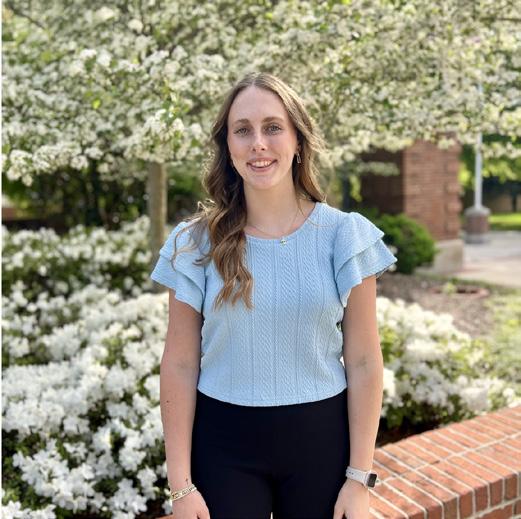
Sophomore Abigail Hurst, biochemistry major, is in the first MEDIC cohort, which started in fall 2023.
“Being involved in the MEDIC RLC has helped me develop lasting and meaningful relationships with my professors and other students with similar interests as mine,” says Hurst. “I love
being a part of the MEDIC RLC because it has enhanced my college experience by allowing me to expand my professional network while also having fun with my peers!” Hurst is planning to apply to medical school in 2026. She will serve as the MEDIC RLC resident assistant in the 2025-26 school year, where she hopes to help the next generation of UTC pre-health students become established UTC.

Mocs in STEM is open to students majoring in chemistry, math or physics, and is coordinated by Angelique Ramnarine, senior lecturer of math, and Emily Alonge, associate lecturer of chemistry. Mocs in STEM students were all enrolled in the same General Chemistry I lecture this year as well as Alonge’s “A Moc’s First Year” freshman seminar. Students also had the opportunity to engage with their peers and faculty coordinators at a variety of activities: a trip to the Tennessee Aquarium, multiple group dinners at local restaurants and a relaxing rock-painting event just before finals. Additionally, after learning about the chemistry of dyes and fibers, students put their new knowledge into action by tie-dyeing group t-shirts, combining creativity with chemistry in a memorable way.
Originally launched as a recruitment and retention initiative, RLCs within the A&SRC are already showing promising outcomes. Fall-to-spring retention rates for first-year A&SRC students are over 20% higher than the campus-wide average. Academically, RLC participants also outperform their non-RLC peers in GPA comparisons.
With these early successes, we look forward to expanding RLC offerings and continuing to find innovative ways to support students both inside and outside the classroom.
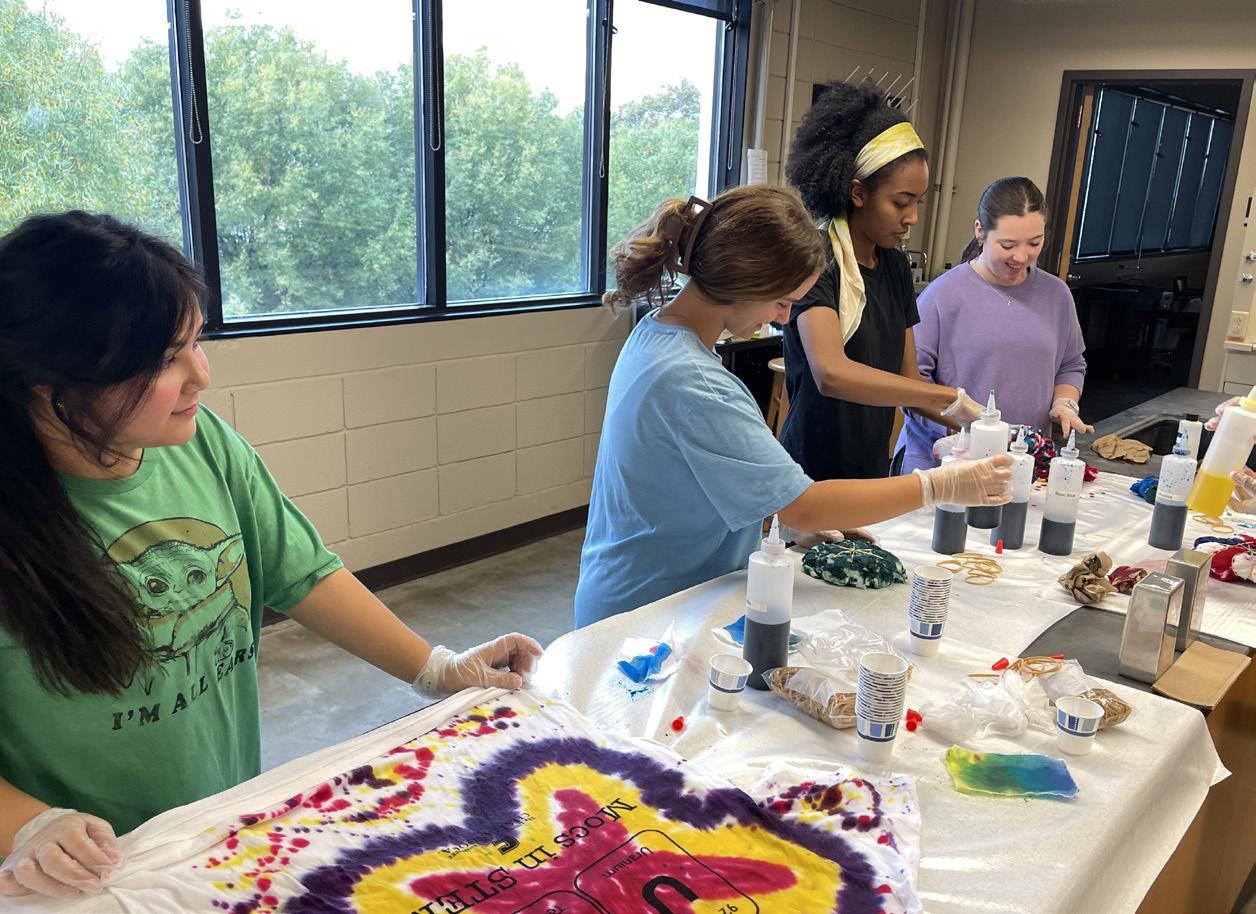
The MEDIC RLC visits the Tennessee Aquarium
Abigail Hurst
The Mocs in STEM RLC participated in a tie-dye event
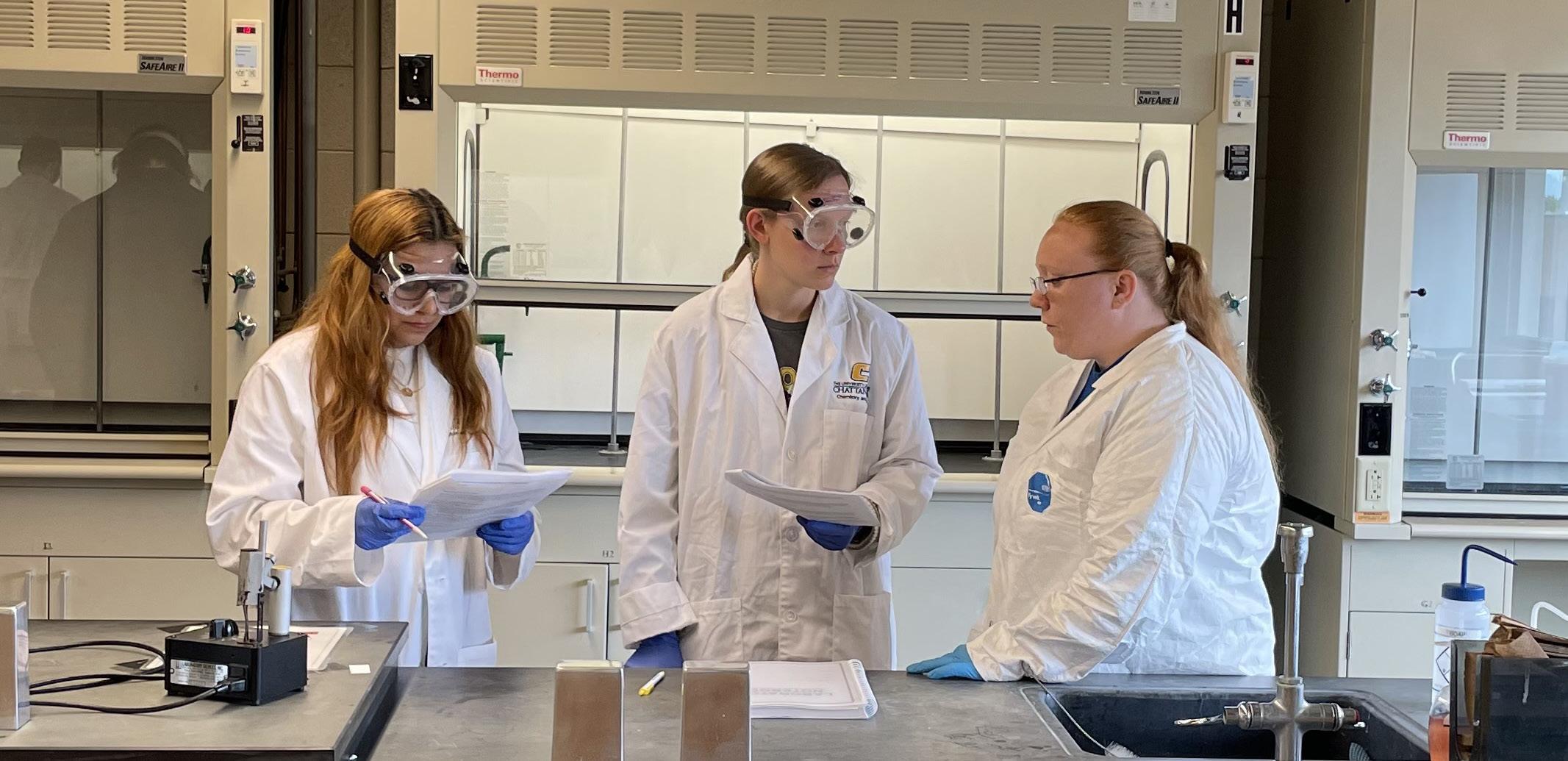
CHEMISTRY MEETS INDUSTRY: UTC COURSE ENGAGES STUDENTS WITH ‘REAL-WORLD LEARNING EXPERIENCE’
When you look at the materials that make up the world around you such as tires, foams and plastics, chemistry probably isn’t the first thing you think of.
For Dr. Meredith Barbee, an assistant professor of chemistry, it’s front and center. And she wants her students to have that perspective, too.
During the spring 2024 semester, she developed and taught a new course for the first time—Polymer Chemistry (CHEM 4040)—with a lecture and a lab.
Polymer chemistry plays a crucial role in many industries, including manufacturing, medicine and electronics, enabling the creation of advanced materials that meet specific needs and applications.
“Polymeric materials are made of long-chain molecules that are built from the same atoms and bonds as other materials,” Barbee explained, “but their large size gives these materials properties that are distinct from small molecules that we cover in other chemistry classes.”
Rising UTC senior Laurel Washburn was one of her students.
“Polymer chemistry is my favorite chemistry course I have taken at UTC,” Washburn said. “Through the course I was able to see how the fields of organic, inorganic, bio-and physical chemistry intersect to create new materials.”
Along with the new course came an opportunity for students to collaborate with a local company.
Just 10 minutes from campus, Woodbridge Foam Corporation—a manufacturer of polyurethane foams—is using principles of polymer chemistry to design new materials and improve its manufacturing process.
Woodbridge is a global company with more than 7,000 employees in 40 locations spanning nine countries. The company’s comprehensive material technologies cater to automotive, commercial, recreational, packaging, health care and building product applications with a full range of services— including prototyping, consulting, technical support, chemical R&D and accredited laboratory testing.
While seeking analytical support from UTC in 2023, Carlisle Glover, a senior development chemist for Woodbridge, was introduced to Barbee and learned about the polymer chemistry course being offered.
“After learning more about the course, I saw an opportunity to create a win-win-win for the students, UTC and Woodbridge by turning our analytical needs into a real-world learning experience for students,” Glover said.
When Barbee designed the new course, she wanted students “to experience the connection between the chemistry and polymer materials firsthand in a lab-based class.”
Polymer chemistry students Maya Sharma, left, and Morgan Williams, middle, discuss their experimental design with Kaitlyn Cathers, a development technician at Woodbridge Foam Corporation.
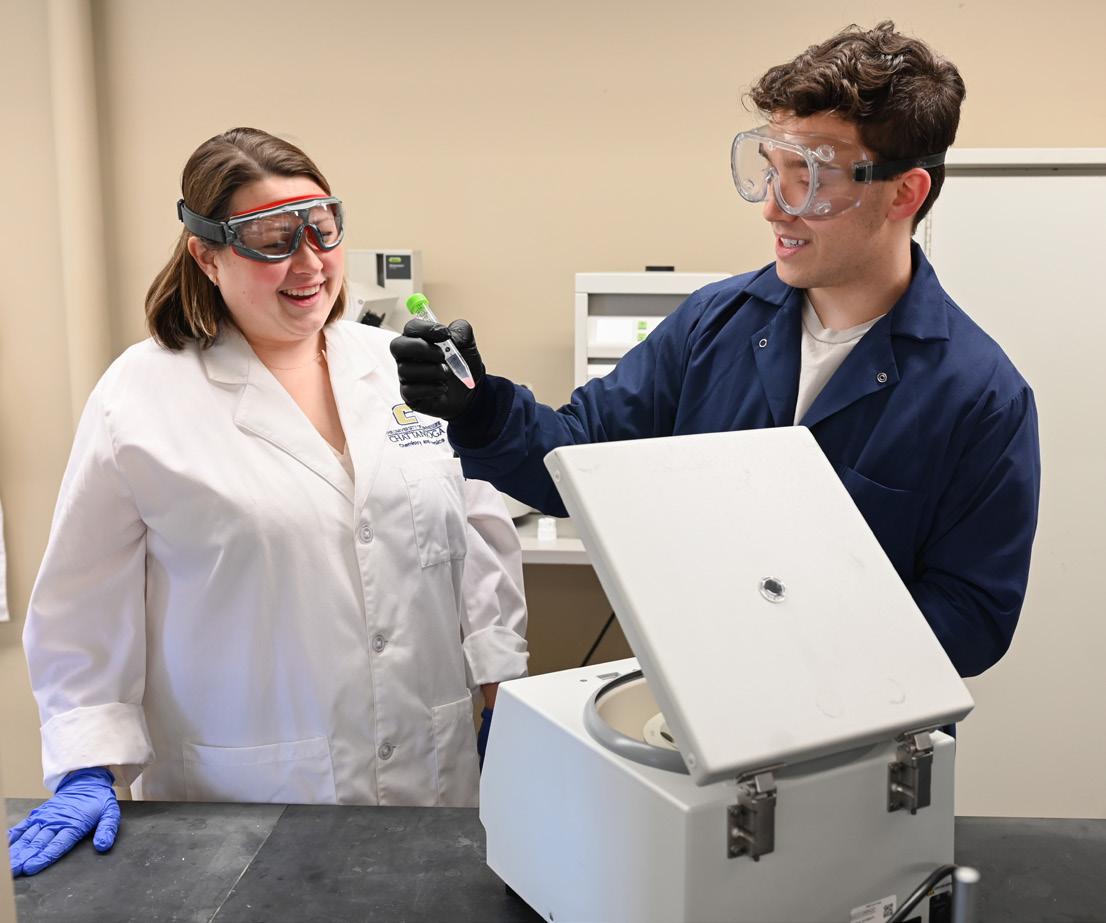
UTC’s chemistry degree is certified by the American Chemical Society, whose Committee on Professional Training establishes guidelines for the approval of bachelor’s degree programs.
“One of the most important guidelines is the requirement for laboratory experience,” said Barbee, a UTC faculty member since 2021. “Laboratory courses give students the opportunity to learn practical skills for safely handling hazardous reagents, synthesizing new compounds and analyzing data. They also provide the opportunity for experiential learning.”
Scientific problem solving and critical thinking are also essential components, she said. In many conventional lab assignments, instructors (and sometimes students) already know what the outcome will be before the experiment begins. In science, that’s typically not the case.
“Chemists are often at the cutting edge of solving problems where outcomes are not known in advance,” Barbee said.
“A top priority for me was for my class to put students in an environment where they would design the experiments, investigate real problems and contribute new knowledge to the field.
“As Mr. Glover and I began to work together, we realized that the problem-solving I was helping Woodbridge with would be the ideal opportunity for students to build scientific problemsolving skills and to learn on a deeper level.”
She explained that Woodbridge was obtaining different results from one batch to another in one of its product lines. The company was interested in understanding more about the structure and size of the polymers it was synthesizing.
Glover and Barbee worked together to include this problem solving in the polymer chemistry lab course, with students traveling to the Woodbridge plant to learn about the manufacturing process and observe the pouring of the polymers to make foam.
“I loved being able to work with Woodbridge, tour their facility and learn how polymerization reactions are conducted at industrial scale,” Washburn said.
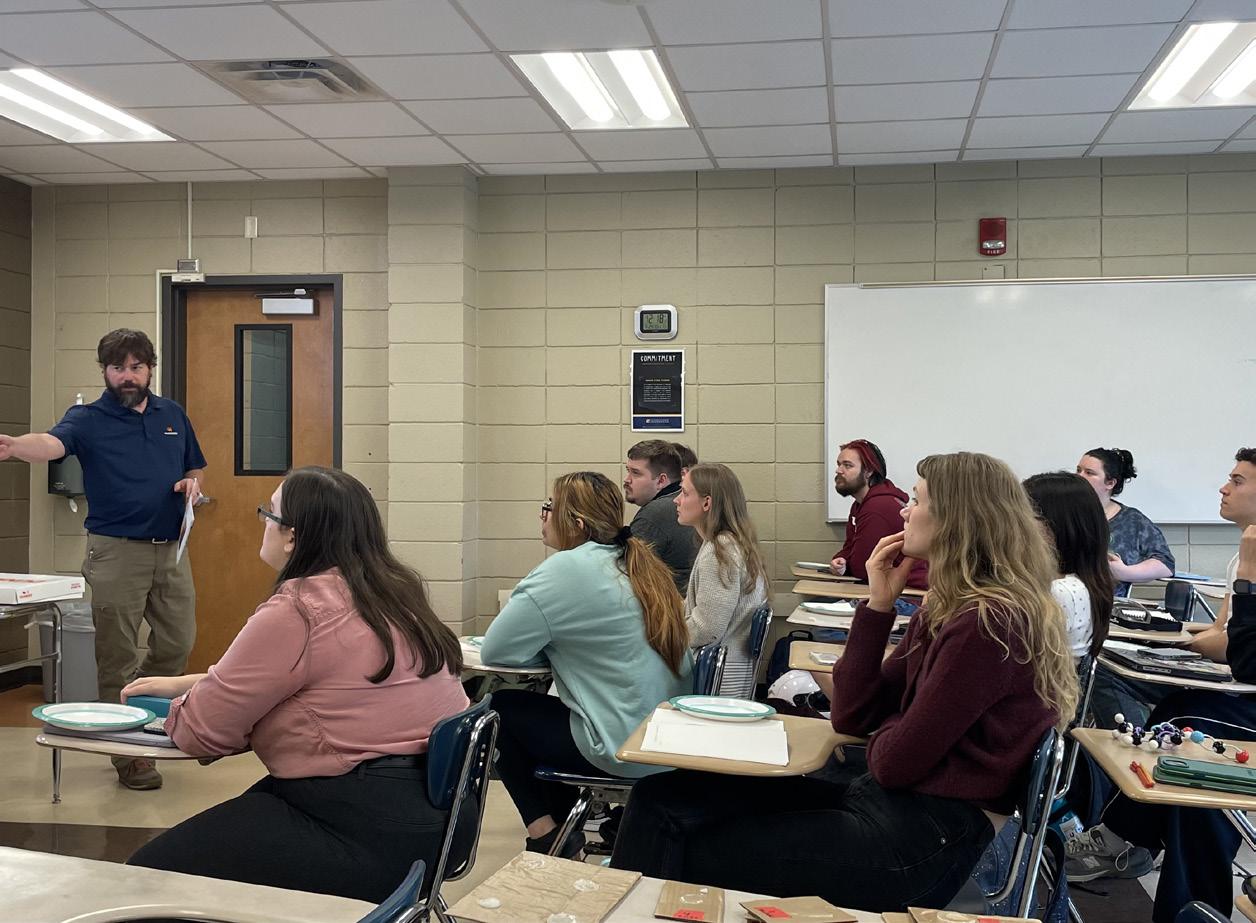
Upon returning to the UTC lab, students worked in pairs to design their own experiments using Woodbridge’s polymers. They discussed their experimental design with Glover and Kaitlyn Cathers, a development technician at Woodbridge.
The class presented the data they collected to Glover and Cathers at the end of the course.
“Collaborating on a project with Woodbridge was an exciting adventure that gave us freedom to use our polymer knowledge and devise a lab procedure to help Woodbridge and ourselves understand how small changes in the synthesis of an elastomer can greatly impact the durability and elastic qualities,” rising UTC senior Chase Matusek said. “Seeing the laboratory at Woodbridge gave me insight on the industry career route of chemistry and better understanding how the small scale but crucial research that goes on that lab is scaled up to for industry purposes.”
Barbee expressed gratitude to Glover, Cathers and Woodbridge for their collaboration.
“Working alongside these professionals has been an incredible opportunity for our students,” she said. “They collected never-before-seen data that will actually be used by Woodbridge in the future.”
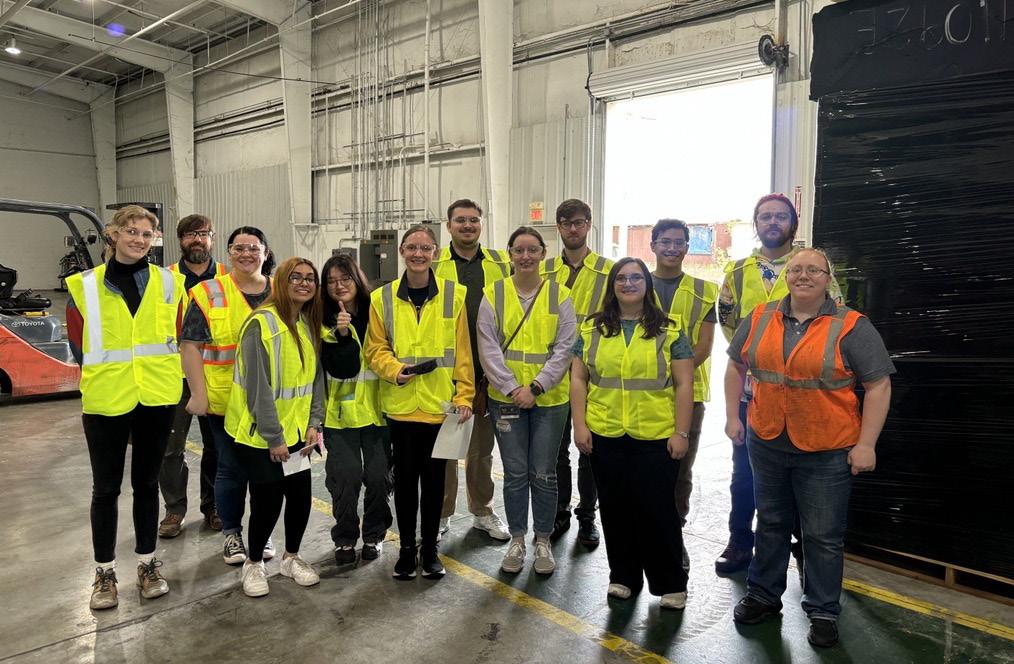
Mr. Glover discusses Woodbridge to polymer chemistry students.
The polymer chemistry class during their tour of Woodbridge's Chattanooga site.
Dr. Meredith Barbee and Chase Matusek work together in the lab at UTC.
TATIANA ALLEN LEADS THE SOCIETY OF PHYSICS STUDENTS TO NATIONAL RECOGNITION
For the second year in a row, the UTC chapter of the Society of Physics Students (SPS) has earned national recognition for its achievements.
Over winter break, the chapter learned that it had once again received the Outstanding Chapter Award from the SPS National Office, cementing its status as a top-tier student-led organization.
“This is the highest level of distinction given to our chapters and is received by less than 15% of our top chapters annually, with just 78 of 844 chapters so honored this year,” Society of Physics Students and Sigma Pi Sigma Director Alejandro de la Puente said in his congratulatory letter.
THE UTC SPS CHAPTER OFFICERS FOR 2024-2025 WERE:
Landon Boone | president physics, senior
Evan Humberd | vice president physics, senior
Olivia Ziemer | secretary biophysics, junior
Ike Deitch | treasurer physics, sophomore
UTC boasts a rich history of student engagement in physics. Sigma Pi Sigma, the physics honor society, was established in 1921, and by 1929, UTC became its seventh chapter. In 1968, Sigma Pi Sigma joined forces with the Student Section of the American Physical Society to create the SPS, now a global organization. The professional association is explicitly designed for students and their advisors and is open to anyone interested in physics and related fields.
SPS chapters are assessed based on their engagement with the campus community, the professional physics community, the public and SPS national initiatives. The Outstanding Chapter Award celebrates chapters that excel in outreach and demonstrate innovative approaches to advancing the SPS mission to “help students transform themselves into contributing members of the professional community.”
The UTC SPS chapter advisor is Dr. Tatiana Allen, UC Foundation professor of physics.
“I know the school year is very full but, from personal experience, I can attest that when an SPS chapter is thriving
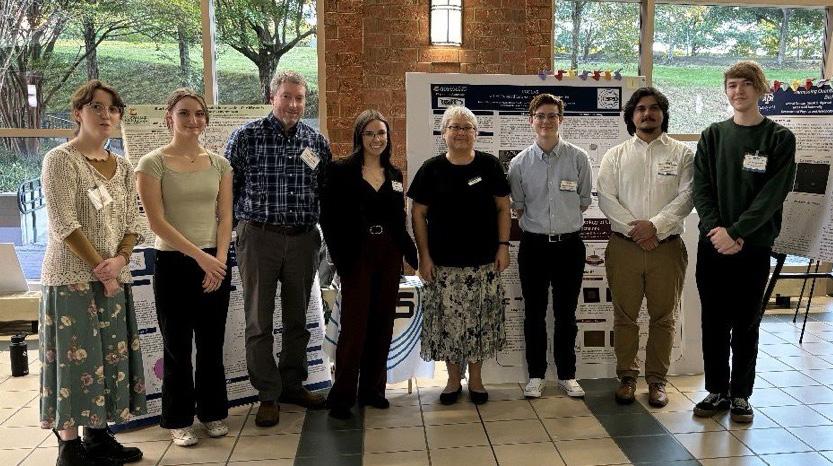
and integrated into the department environment, it is often a sign of an advisor who is committed and actively engaged with their students,” de la Puente wrote. “To have your group named an Outstanding Chapter is a testament to your leadership skills and your ability to foster leadership among your students.”
Adding to the recognition of UTC’s SPS chapter, Dr.Allen has been named the 2023–24 Society of Physics Students (SPS) Outstanding Chapter Advisor for her leadership and guidance of our SPS chapter.
The Outstanding Chapter Advisor—the highest honor given annually by the SPS—is bestowed to one advisor among approximately 850 chapters nationwide. The award recognizes exceptional leadership, student leadership development and the support and encouragement an advisor provides to their chapter.
Allen received the award at the recent American Association of Physics Teachers winter meeting in St. Louis. Her accolade was also featured in “The SPS Observer,” published by SPS and the American Institute of Physics.
“It is a great honor,” said Allen, a member of the UTC faculty since 1993. “I learned later that our SPS students nominated me. They kept it a secret, so when I got a note from the national office, it was a big surprise.
“For me, being recognized for working with students is one of the greatest joys of our profession. I am very grateful.”
Dr. Keenan Dungey, head of the UTC Department of Chemistry and Physics, said that Allen—the associate head of physics —“has revitalized our chapter of the Society of Physics Students.”
“Under her leadership, the students have applied for and received national grants to support their projects. They also perform outreach to the community, such as volunteering for Earth Day at the Creative Discovery Museum,” Dungey said.
Prof. Tatiana Allen, Prof. Josh Hamblen and physics students representing SPS at the Southeastern Section Meeting of theAmerican Physical Society.
“And we have resumed inducting members into Sigma Pi Sigma, the national physics honors society.
Allen, who has taught physics for nearly 40 years, became the SPS chapter advisor in 2021. Her tenure began during the COVID-19 pandemic, a time when remote learning made it challenging to engage students, and SPS activities had largely ceased.
To revive student engagement, Allen proposed a project to assemble a LEGO model of the Kibble balance, a device developed by the National Institute of Standards and Technology (NIST) to redefine the kilogram based on the Planck constant. The project, funded by an SPS Chapter Research Award, became a catalyst for rebuilding the chapter’s sense of community.
Allen’s emphasis on hands-on projects and student leadership has led to notable successes. Physics major Landon Boone, who helped lead the LEGO Kibble balance project
as a freshman, went on to secure a Summer Undergraduate Research Fellowship at NIST. Following his fellowship, Boone— now a senior and the UTC SPS president—was offered a fulltime position working with the Kibble balance.
Allen’s most recent initiative is the LEGOLAS project—short for LEGO-based Low-cost Autonomous Scientist—a machinelearning model developed at the University of Maryland, College Park. UTC students received another SPS Chapter Research Award to construct the model, advancing the project by modifying the design and rewriting the manual.
In “The SPS Observer” profile, Allen was asked to offer advice to advisors.
“Find good projects that will unite the group,” she said. “Let the students run them, own them, be leaders, be responsible and be creative. Be ‘on call’ if help is needed, but foster independence, problem solving and building community. Students have so much to offer. Let them shine.”
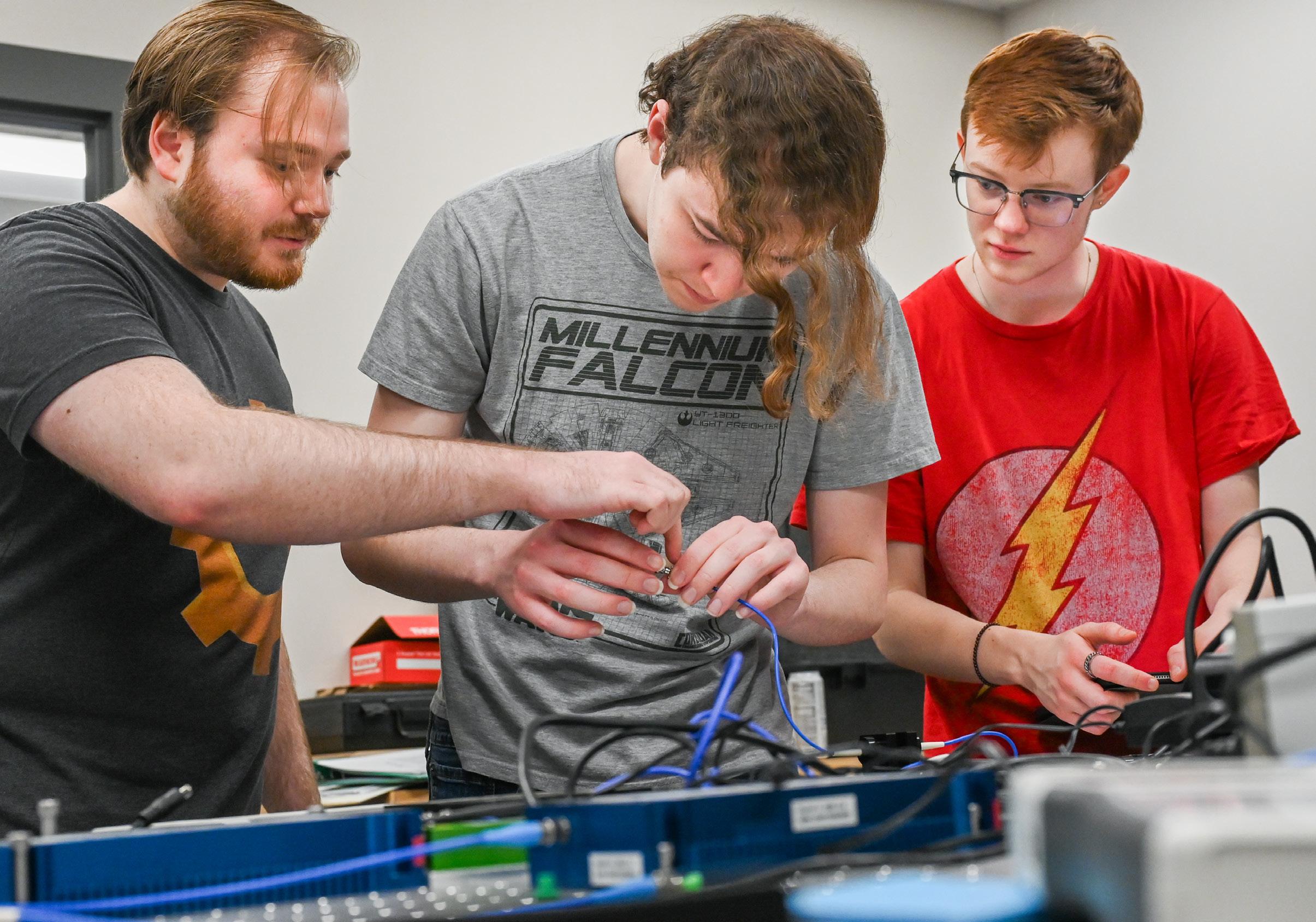
Landon Boone, Evan Humberd and Sam Glandon
SCIENCE ON TAP DEBUTS TO STANDING-ROOM-ONLY CROWD
Turns out, when you invite people to grab something to eat, drink and to hear directly from a world-class scientist, people in Chattanooga show up.
Almost 100 people, in fact, showed up on for the debut presentation of Science on Tap in early February. Organized by UTC, Science on Tap is planned to recur on the second Tuesday of every month, during the fall and spring semesters, as an opportunity to share UTC expertise with the community in a relaxed, social setting.
Its presenter was the inaugural director of the UTC Quantum Center, Dr. Rick Mukherjee.
In his talk, “The Quantum All Around Us,” Mukherjee highlighted major developments of the first and second “quantum revolutions.” These are timely topics in 2025, which the United Nations has declared to be the international year for quantum science and technology.
His brief presentation was a roll call of some of the most significant theoretical physicists in history, including Nobel Prize winners Max Planck, Albert Einstein and Niels Bohr, along with John Stewart Bell.
About 125 years ago, Planck “came up with a completely pathbreaking interpretation of how light should be treated as photons,” or discrete packets of energy, rather than waves, Mukherjee said. Then came Einstein, “who saw how energy can be transferred from photons to electrons—the photoelectric effect, which is what his (1921) Nobel was awarded for, rather than his more famous theory of relativity.”
In 1922, Bohr won the Nobel in physics for his theories on atomic structure and quantum theory.
“That’s where he gave a quantum theory for matter, basically how to model atoms, and now you take matter and light and make them interact because that’s what’s happening every
day in whatever object you see, whatever you do, it’s light interacting with matter,” Mukherjee said.
Bell was cited for the mathematical criteria he created to distinguish quantum correlations—such as involving entangled photons—from classical correlations.
A classical correlation example, Mukherjee explained, is such as when a friend is wearing the left-hand glove of the only gloves you own, and you’re with your friend, looking for the other glove. You know the missing glove is for the right hand.
In the “second quantum revolution” on which the world appears to be embarking now, Mukherjee said, potential future applications include quantum computing, quantum sensing and quantum cryptography.
“People are trying to build better quantum sensing. There are exotic materials, new drug discoveries that can come from quantum research. That’s quantum materials,” Mukherjee said. “Then there is secure quantum internet and distributed quantum computing where there’s an active area of research going on. Of course, the holy grail is to build a fault-tolerant quantum computer.”
That’s a computer that could overcome the inherent fragility of quantum information so that it could continue functioning despite the presence of errors or imperfections.
Over the course of a robust Q&A session that followed Mukherjee’s talk, he described what’s happening at the UTC Quantum Center, which he joined in December. Experiments with quantum networks, quantum sensing and developing quantum algorithms are underway or planned.
Mukherjee praised the quantum center’s high-profile collaborators, EPB and Oak Ridge National Laboratory, for what their partnership is enabling UTC to do within the research community and for Chattanooga, the state and beyond.
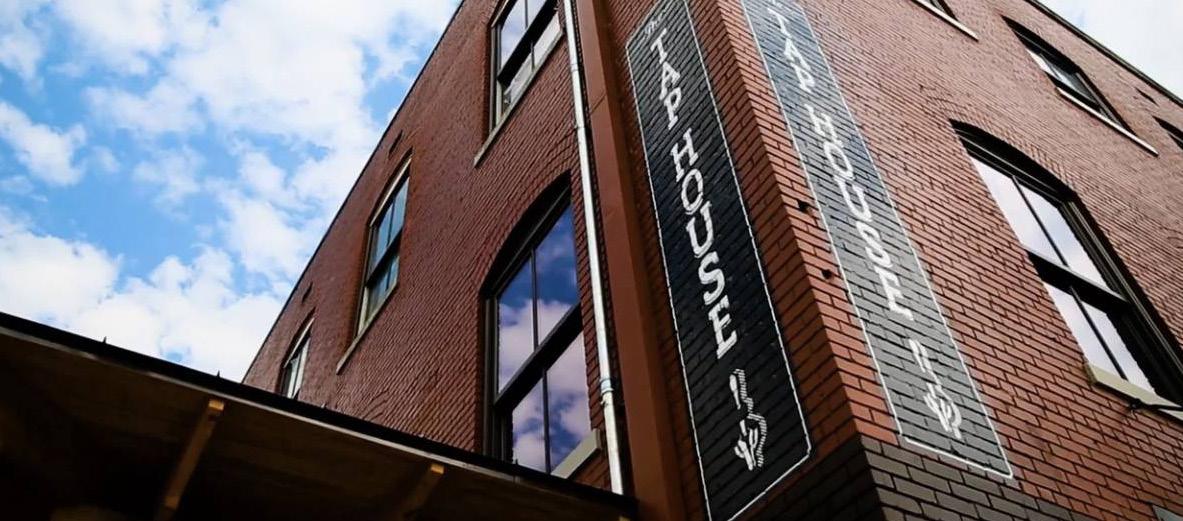
UTC PHYSICS ALUM REBECCA GODRI LANDS PRESTIGIOUS DEPARTMENT OF ENERGY AWARD

Rebecca Godri, a 2021 UTC graduate, is making waves in the physics world after being selected for the U.S. Department of Energy’s (DOE) Office of Science Graduate Student Research (SCGSR) program.
The SCGSR award, considered one of the most
esteemed honors for graduate research in physics, supports promising graduate students by providing funding for research projects that align with the DOE’s scientific priorities.
For Godri, the award offers essential support to continue her groundbreaking research at Oak Ridge National Laboratory (ORNL).
“This is giving me access to staff scientists,” Godri explained. “For example, I have a staff scientist with whom I’m collaborating and I can go to him every day if I want to and say, ‘Show me how to do this. Train me on how to do that’—which is exactly what I’m going to be doing.”
Godri is currently pursuing a Ph.D. in physics at UT Knoxville after earning her master’s degree there in 2023. As part of her research, she is studying neutron beta decay via the Nab experiment at ORNL.
“Nab stands for neutron a and b, so it’s the little ‘a’ and little ‘b’ parameters in neutron beta decay,” she explained. “The Nab experiment studies the decay of a free neutron, meaning the neutron when it’s outside of a nucleus. Within about 15 minutes, that neutron will decay. We have a really big magnet, and what the Nab experiment does is it uses those neutrons; when the neutron decays, if it decays within that magnet, then the proton is going to be accelerated up to an upper detector and the electron is going to be detected in both detectors.
“What we can do from that is we get the proton time of flight—which is just how long it takes for the proton to get up to the detector—and we can extract its momentum. That, combined with our other measurable data, will allow us to extract little ‘a’ and little ‘b.’ So it’s a test of the Standard Model of Physics .”
Godri’s research path began during her undergraduate days at UTC, where UC Foundation Professor of Physics Josh Hamblen recognized her potential early on.
“I remember meeting her at freshman orientation and I could already tell she was special in terms of her background and preparation,” said Hamblen, a member of the UTC faculty since 2009.
He recalled how Godri began doing research with him during her freshman year and participated in the Department of Chemistry and Physics’ 10-week summer research program, which set her on the path to her current achievements.
“She was able to present her research at our regional Southeastern Section of the American Physical Society meeting after that first summer,” Hamblen said, “and she’s kept being successful from then on.”


Rebecca Godri (pictured far right) and two of her UTC physics undergraduate colleagues, John O’Neal and Sara Mitchell, traveled to Oak Ridge National Laboratory in March 2020.
“By the time she was a senior, she was able to touch base with our colleagues at UTK. That’s where this Nab relationship started, which led her to this impressive position in graduate school.”
Godri agreed that her early indoctrination to research through Hamblen was pivotal.
“He told me to apply and I was like, ‘I don’t think I’m qualified. I’m not a senior physics student; I’m just starting out. I don’t know if I’m going to be good enough.’ And he was like, ‘Just apply anyway.’ So I did, and then I got it,” she recalled. “Obviously, I’d never had any research experience before and it was not tough—but it was just very new to me.”
“By the end of the 10 weeks, it was completely different. I was able to present and talk about the research that I did and it actually made sense. It was just such a great experience and without it, I’m not quite sure if I would be in nuclear physics. It just really opened my eyes to how cool nuclear physics can be.”
Hamblen, who explained that the Nab experiment is comprised of approximately 50 scientists from a number of universities across the country, said Godri’s enthusiasm for research led to quick growth in the field.
“Her ability to do research early on gave her skills that made her competitive for top graduate programs,” he said.
“She started with small steps at UTC, but over time, she’s been able to do more and better things in her research work.
“I’m happy that I was able to get her started and get her foot in the door on this kind of research. She’s really taken the ball and ran with it. Now, she’s basically at the lab running the experiment, making the measurements that she needs to do.”
Reflecting on her time at UTC, Godri expressed gratitude for the close-knit support she received from the physics faculty.
“I really enjoyed my time there. I miss it,” she said. “The department is small, so it felt like everybody was a little family. All the other students were great and supportive, and my best friend (Sara Bey) graduated with me. I still talk to her all the time.” Bey, she said, is now in graduate school at the University of Notre Dame.
“I remember my first semester; there’s an undergrad class that you take which basically shows you all of the different opportunities that you can have in physics as a career—what that can look like, how to prepare, how to succeed,” Godri continued. “Right off the bat, that was such a great way to be introduced to the department. We were shown all of the different possibilities and it was just so supportive.”
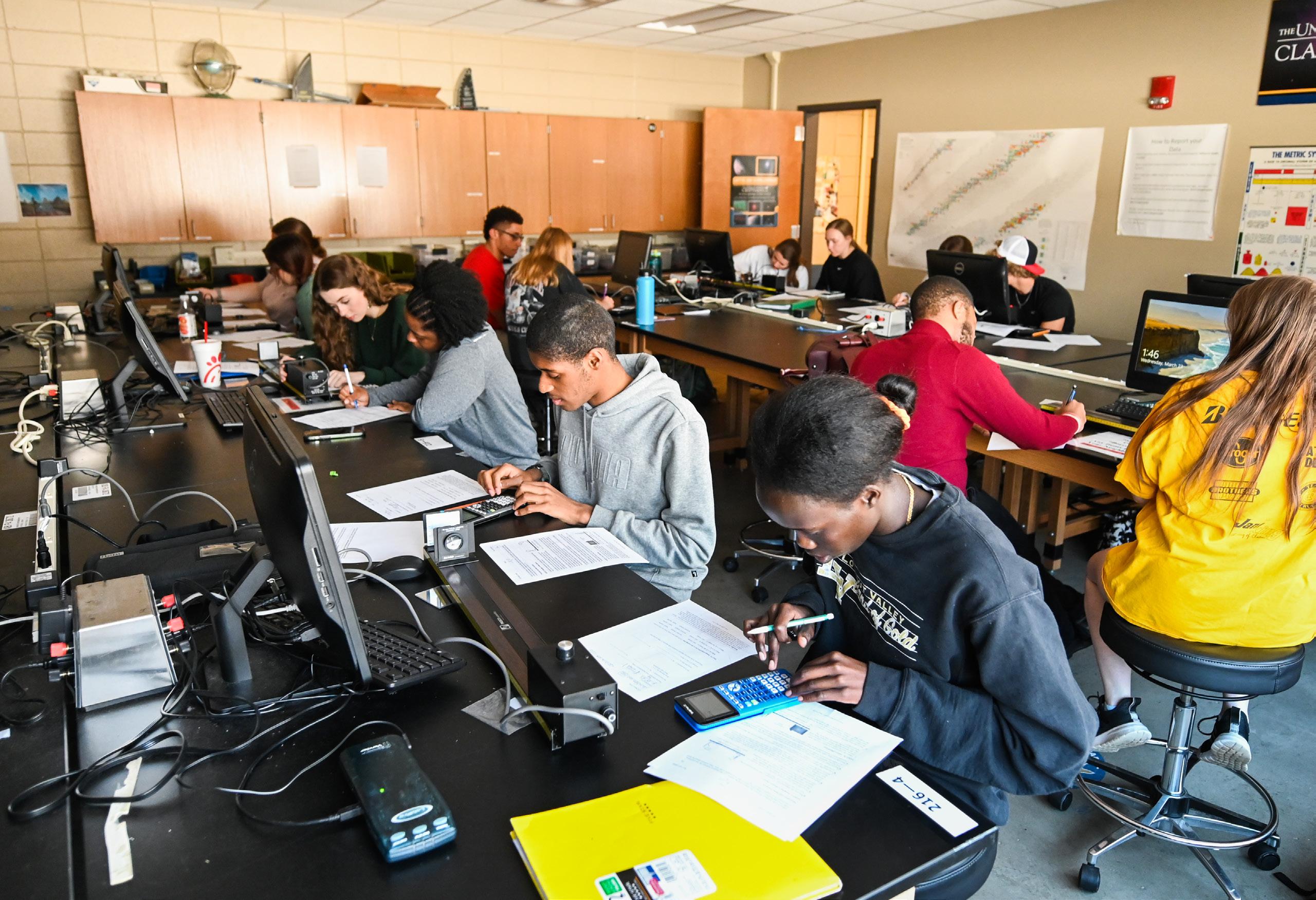
STUDENT PROFILES
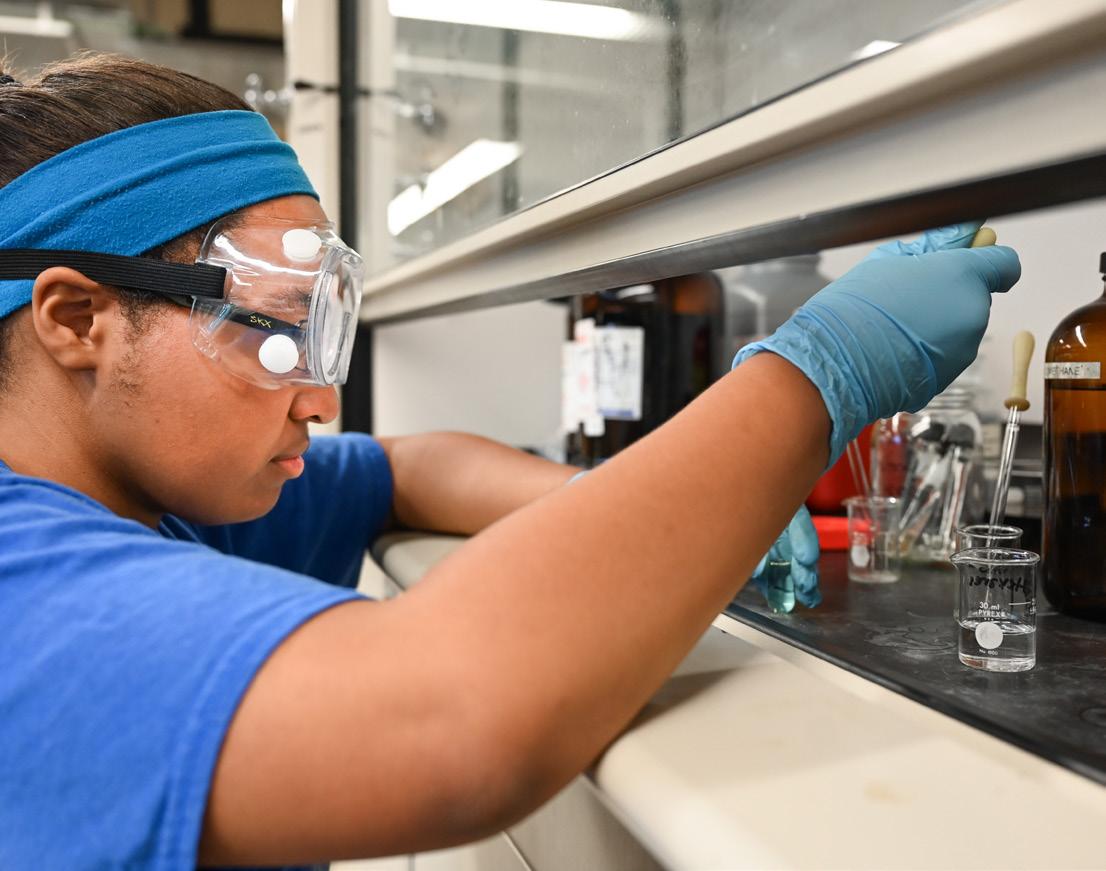
Alyssa Matthews
Alyssa Matthews’ love for the outdoors made UTC a good fit for her undergraduate studies. She is a driven student and has been quite active in research as well. Her research focusses on TPM ligands, which are complexes that can be coordinated to metals and attached to biomolecules. Her work has successfully coordinated the ligand to manganese and is currently exploring the effect of different functional groups on the ligand’s bioconjugation ability. After UTC she plans to continue her academic journey in medical school, specializing in pediatrics. Her experience at UTC has sparked an interest in research as well, so she is also considering a doctorate degree focusing on medicinal chemistry. After UTC she plans to continue her academic journey in medical school, specializing in pediatrics. Her experience at UTC has sparked an interest in research as well, so she is also considering a doctorate degree focusing on medicinal chemistry.
SCAN QR CODES TO WATCH INTERVIEWS WITH THE STUDENTS
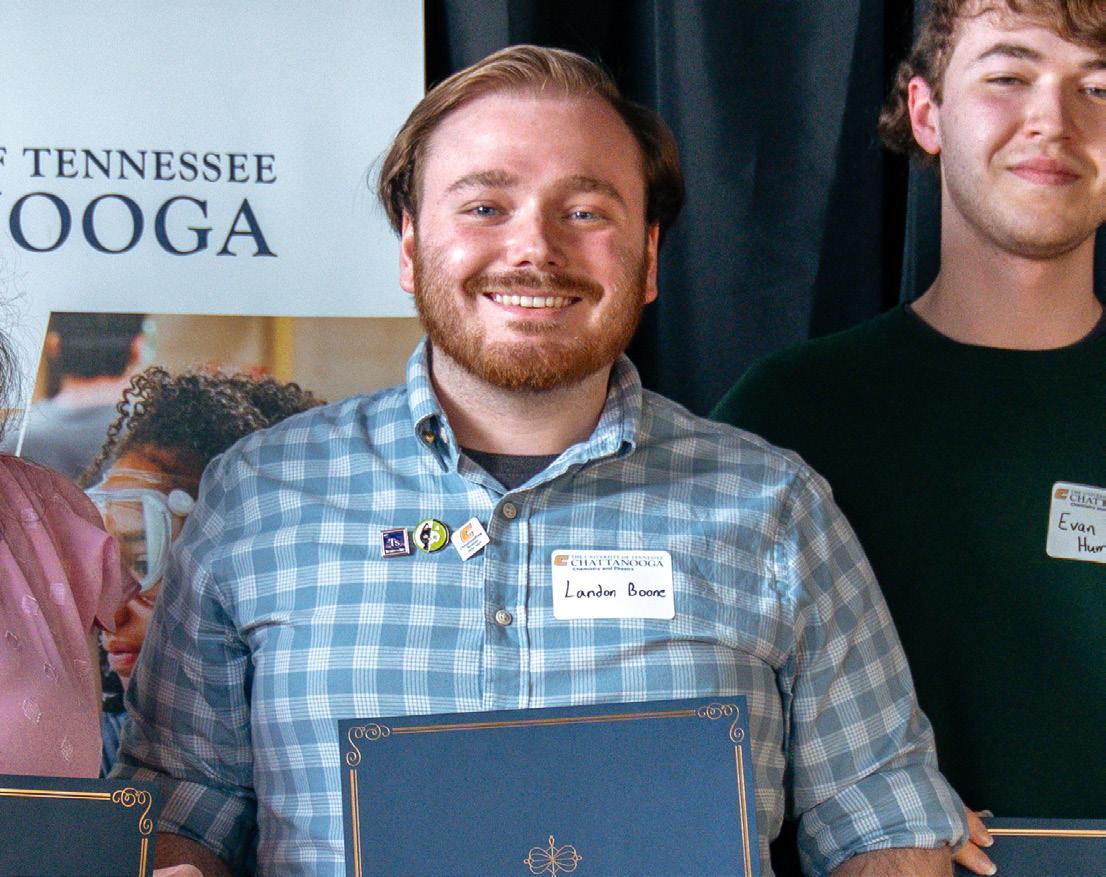
Landon Boone
Landon Boone was initially drawn to Chattanooga’s scenic setting and over his time here, he has thrived in the physics department as a student, club leader and researcher. Landon came to UTC with an appreciation for physics and the fundamental understanding of matter that this subject can provide. His general appreciation for physics has become more focused at UTC through his research in the field of quantum sensing. He is also the president of the UTC Physics Club, which has been very active in the community, participating regularly in competitions The club has engineered and constructed robotics to perform various tasks, including a Kibble balance, which accurately determines an object’s weight through the application of electrical power. The application of machine learning to the data collection and analysis have accelerated the project’s performance as well.

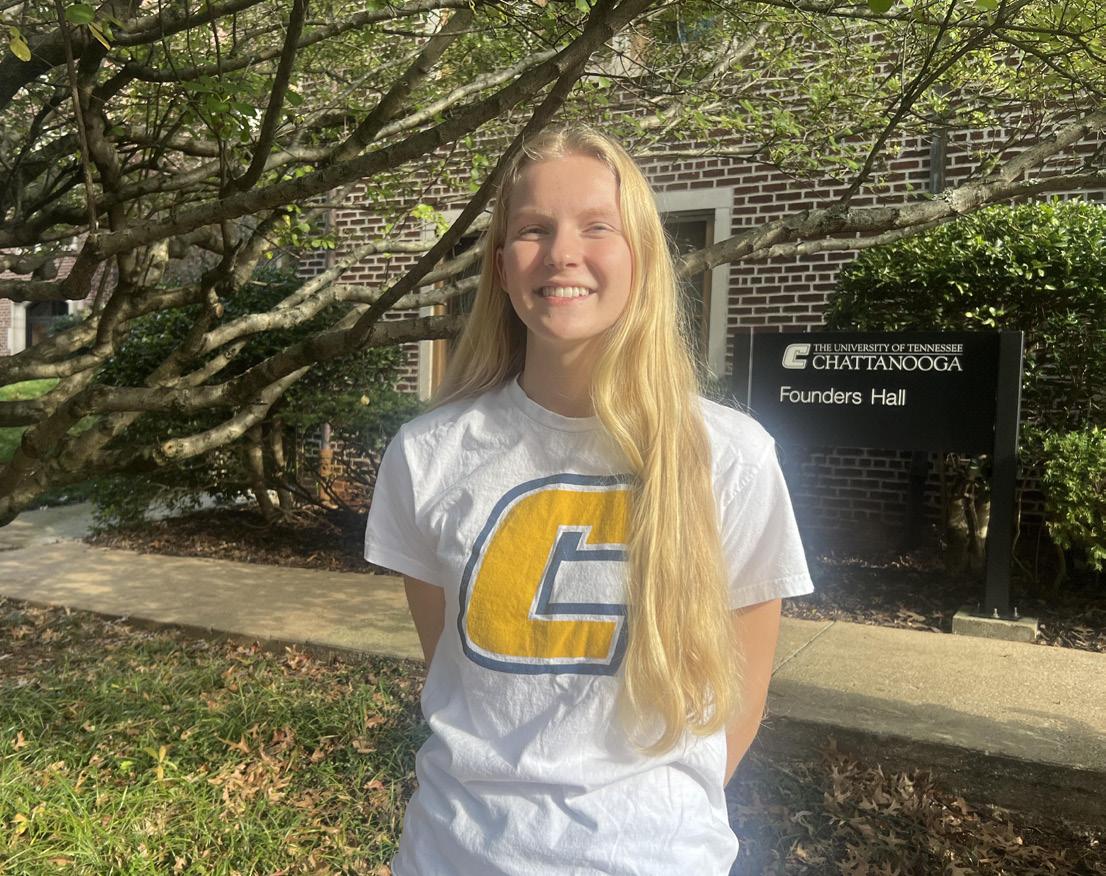
Megan Black Pollianna Moshenskiy
Megan Black is a Chattanooga native who came to UTC to pursue science, hoping to further her understanding of the world around us. Her research has focused on colloidal suspensions, which have a wide range of applications including pharmaceuticals and cosmetics. Specifically, her work has studied the flow characteristics, or rheology, of these colloid systems, which can be affected by additives. She has had a rewarding research experience at UTC and is
Pollianna Moshenskiy is in her first year at UTC but has arrived with drive and momentum. She graduated from Cleveland High School with an associate’s degree as well, which was made possible by the Tennessee Valley Early College at Cleveland State Community College program. She is currently a biochemistry major and a Brock Scholar in the UTC Honors College. She chose UTC for the beautiful setting and the size of the school, in addition to the experiential opportunities
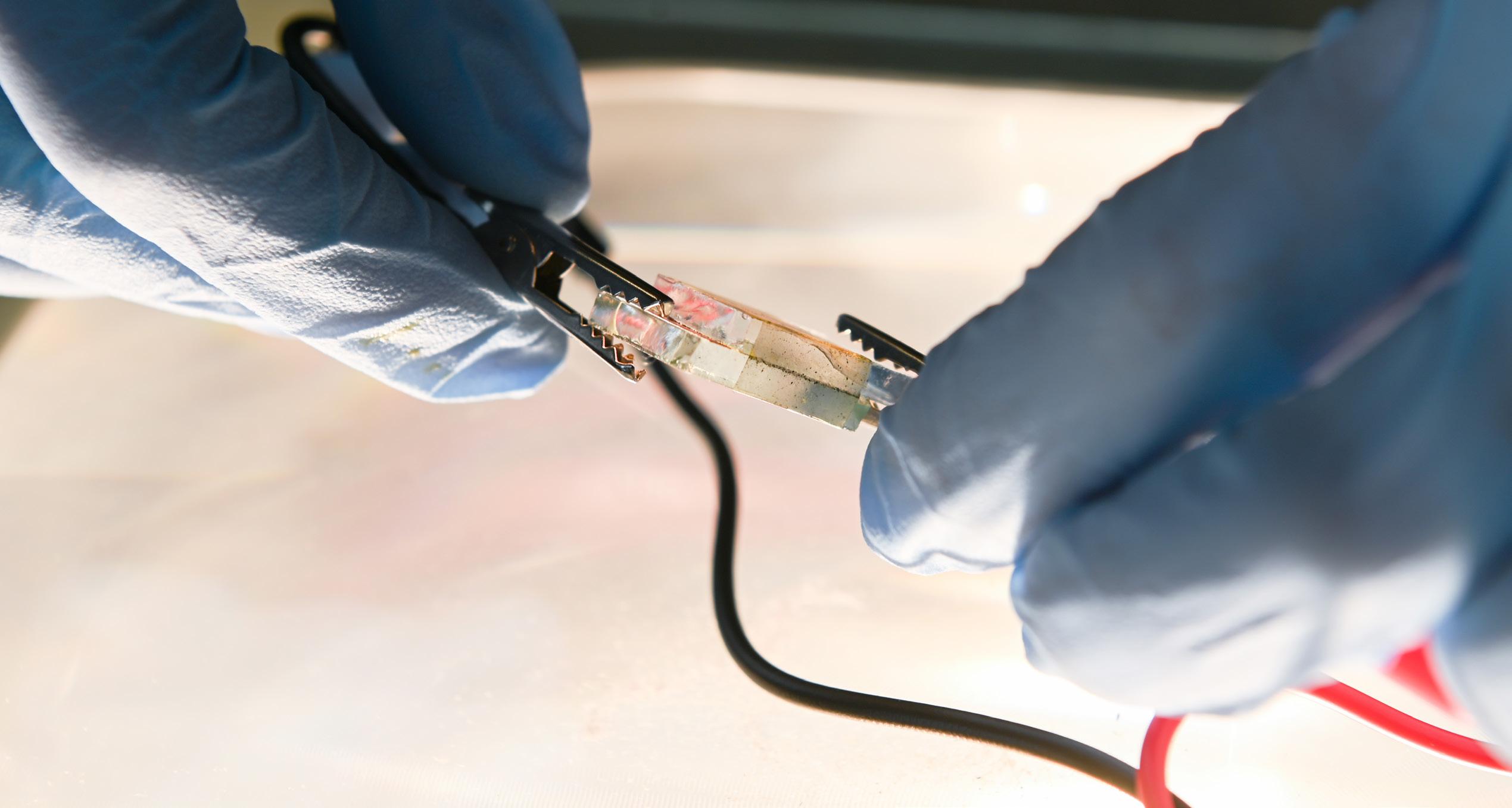
RICHARD ZHANG: TURNING IDEAS INTO REALITY
UTC alumnus Richard Zhang has been turning ideas into reality for a long time.
He freely admits that his path through UTC came about totally by accident.
It was the late 1980s, and 18-year-old Xike Zhang had the idea that he wanted to study abroad. China was only beginning to open up to the world, and the Shanghai-born teenager was determined to do something that, at the time, was quite unusual in his part of the globe: Go abroad and explore this vast world of ours.
“I wanted to be exposed to Western culture. I wanted to learn the broader world,” Zhang recalled. “I was incredibly poor in the sense that in those days all Chinese were very poor, but I was well-educated. My parents were college-educated, even though they were only making the equivalent of $50 a month, collectively.”
Zhang, who began learning English when he was in the third grade, was researching American universities. He literally stumbled upon UTC.
“To be honest,” Zhang said, “I didn’t even know there was a state of Tennessee—much less a University of Tennessee or Chattanooga—when I began looking. It was not something necessarily well planned, and it was very much by accident that I found UTC. I couldn’t afford to pay multiple application fees for different schools or a four-year college tuition. The beauty of UTC was that I was able to defer paying my application fee until after admission. So I applied.
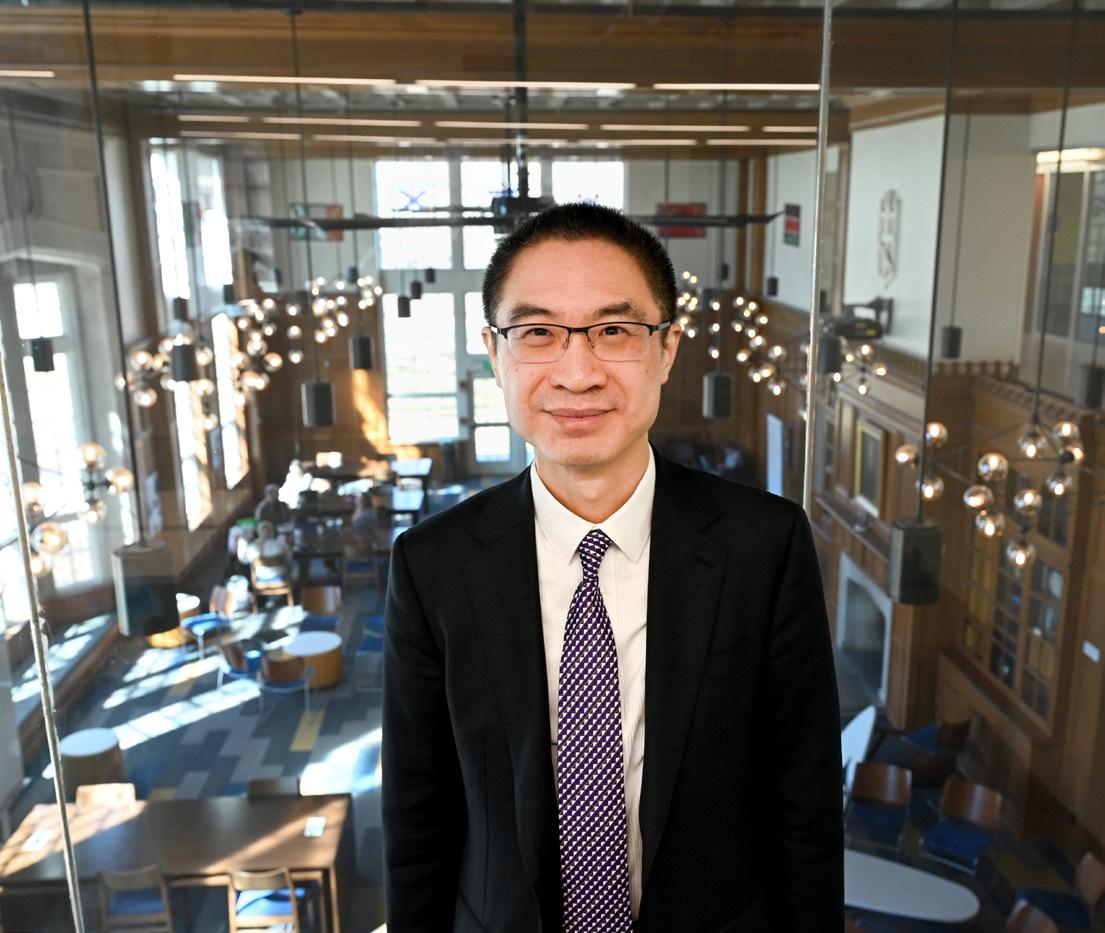
“UTC later awarded me a Brock Scholarship, thanks to Dr. Bob Fulton. And with that Brock Scholarship, in those days, it essentially became completely free tuition. That allowed me to spend four years in Chattanooga.”
Sight unseen, Zhang made his way from Asia to North America. He was laughing as he recounted his less-than-direct, halfway-around-the-world route to UTC, starting with a train from Shanghai to Hong Kong followed by flights to Detroit, Memphis and Chattanooga.
“I arrived in Chattanooga and fell in love with the place,” he said. “I thought it was just a terrific, friendly city, and it exposed me to a lot of the wonderful Southern culture.”
He was known by his given name of Xike back then. He chose to go by Richard upon entering the workforce after earning a master’s degree from the Kellogg Graduate School of Management at Northwestern University. And it became his legal name when he was naturalized as a United States citizen.
Zhang immediately immersed himself in the city, the culture and his studies.
Tom Rybolt, a UC Foundation professor of chemistry and one of Zhang’s first UTC instructors, quickly saw the learning capacity of his young protégé.
“Xike knew a lot of chemistry from his high school experience, and at some point, I asked him about doing research. He was interested in that,” Rybolt said. “There was a rich tradition within our chemistry department of faculty having undergraduates perform research with them. One benefit was publishing papers together, as Richard and I did.”
“I also recall this one other time when some of the research we were doing was in programming and it was in a language called Fortran, which you don’t hear much about anymore. Xike was going on a bus trip to Chicago and some other places. He asked about the programming, so I gave him a book that he took with him to read on the bus. He knew an awful lot by the time he came back, just from reading that book. It was quite striking in terms of his ability to learn and apply things.”
That one-to-one relationship resonated with Zhang. He spent multiple years working on projects with Rybolt.
“I had an opportunity that very few undergraduate students, even at the Ivy League universities, receive—this experience of working so closely on a research project with a tenured professor,” Zhang said. “To be an undergraduate like I was and to be able to work with a tenured professor doing cuttingedge research, being able to publish papers, speaking at an international conference.
That kind of unparalleled opportunity was just unique. Dr. Rybolt and I formed a strong friendship. He had a huge influence on me.”
As a member of the UTC Honors program, Zhang took elective courses introducing him to the concepts of economics and accounting. He also participated in Student Government Association as a senator, becoming chair of SGA’s academic and ethics committees, serving as an officer in various honor societies and organizing resident hall programs.
“I took a lot more credits than I needed to graduate,” Zhang said. “Once you take your required course load, you didn’t pay extra tuition for additional courses. I was like, ‘Why not?’ It’s like, ‘Buy one, get one for free.’ I admit that I took advantage of the free-market mechanism and that benefited my learning.
“I went to UTC to study chemistry because it’s a scientific discipline, but everywhere, science is the same. Quickly, I became fascinated by economics, by the market economy, by the Western way. I ended up taking economics as well as accounting as majors. I was passionate about learning new things. It was overwhelming, but there was so much to learn. Every day presented new challenges. I found it both intellectually challenging and personally rewarding.”
Zhang majored in economics and accounting in addition to chemistry. He graduated summa cum laude in 1992. He received several major U.S. national scholarship awards and was named to USA Today’s All-USA College Academic Team in recognition of his outstanding academic accomplishment and community service as a college student. He was the recipient of the Honors College’s Sompayrac Alumni Award in 2019.
He has led Apax Partners’ operations in mainland China, Hong Kong, Taiwan and Southeast Asia since 2008, including private equity investments and fundraising. Apax is a leading global private equity advisory firm headquartered London.
Before that, Zhang was a senior partner at McKinsey & Company, a management consulting firm. He was the first person with a mainland Chinese background to serve on McKinsey’s global partner election committee and was responsible for evaluating partner candidates in the firm’s Chicago office, where he started his professional career in 1993.
Zhang is a well-recognized business and community leader who has served on corporate and nonprofit boards. He is passionate about the potential of education to change peoples’ lives and society for the better. He serves on the global advisory board of the School of Education and Social
Policy and the Asian Executive Board of the Kellogg School of Management at Northwestern University, where he earned his master’s degree in finance.
During spring 2019, Zhang returned to Chattanooga for the first time in more than two decades to establish multiple gift agreements with the University. For him, it was an opportunity to repay UTC for changing his life’s trajectory.
Zhang created the Robert Fulton and Richard X. Zhang Endowed International Exchange Scholarship Fund; the Tom Rybolt and Richard X. Zhang Endowed Undergraduate Research in Chemistry Scholarship Fund; the Richard X. Zhang Endowed Business Professorship Fund; and the Richard X. Zhang Annual Honors College Scholarship Fund.
“I just felt it would make sense for me to make some contributions to each of those things, each of which I benefited from when I was at UTC,” he said. “I’m a deep believer that education changes lives. Education creates a lifelong impact on the betterment of an individual. I have this deep passion
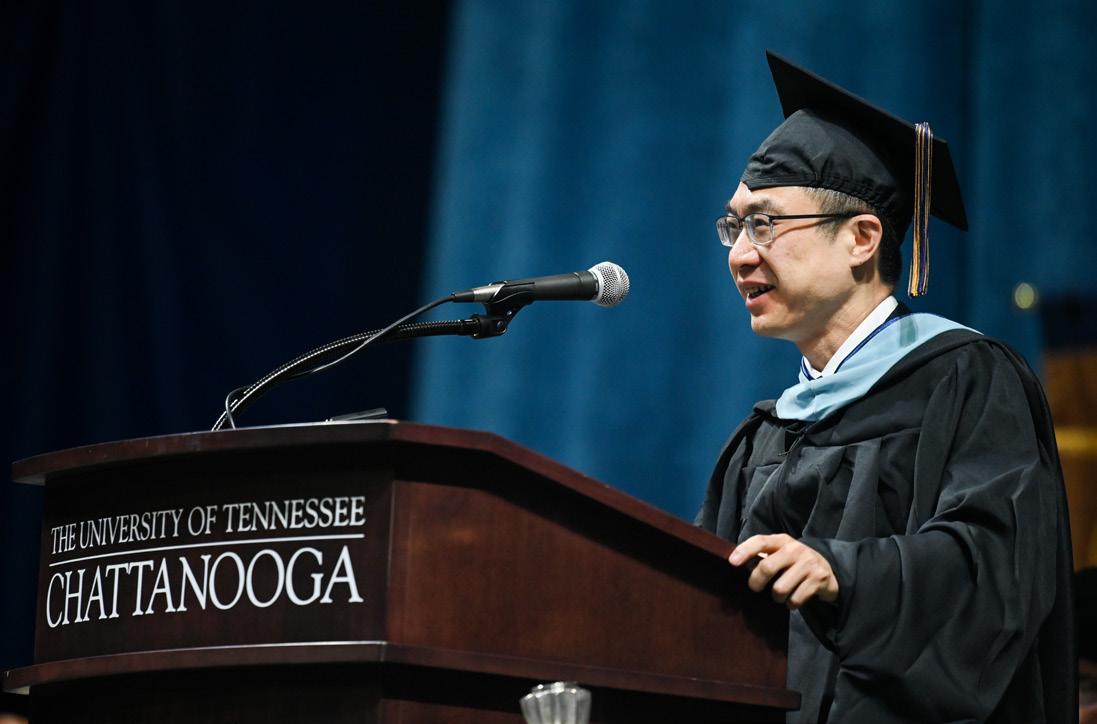
for education and toward making high-quality education accessible to anyone and everyone.”
“My motivation was simple: To contribute back to the University that gave me the quality of education that changed my life. I also wish to see the University become an even stronger force with an ever-increasing national prominence and global impact.”
“I recognize that it’s important to turn ideas into reality,” Zhang said. “I’m hoping with these gifts that I’m helping in some small way.”
Richard Zhang presenting the May 2024 UTC undergraduate commencement speech.
FACULTY AND STAFF UPDATES
There are several faculty and staff members who have retired, taken on new roles or joined our department this year. Congratulations to them all.
RETIRING STAFF
UC Foundation Professor Tom Rybolt retired in May 2024 after 44 years at UTC, including six as a department head. Dr. Rybolt and his research students, along with other colleagues, have published 70 articles in science journals that have received 780 citations. Fifteen Sherlock Holmes chemical mysteries co-authored with Dr. Tom Waddell were published in the Journal of Chemical Education, compiled by them into a book, and translated into six different languages. Dr. Rybolt also has written four book chapters on nanoscience and moleculesurface interactions and has authored or co-authored 28 books. Most of these are children’s science books, and many were written with Dr. Rob Mebane. Mebane’s and Rybolt’s books have sold more than 100,000 copies.
Dr. Rybolt received a UT National Alumni Teaching Award in 1997, and in 2023 he received the College of Arts and Sciences Lifetime Research and Creative Achievement Award. By his estimate, he has taught more than 10,000 students at UTC and graded by hand about one million exam or lab questions and problems. He has taught 21 different unique lecture and laboratory courses, including ones that he developed. His last new course was on global warming and was taught Spring 2024 with Professor John Tucker this semester in the Honors College. However, according to Dr. Rybolt, what is most important to him is that he has been married to Dr. Ann Rybolt, a physician, for 48 years, and together they have 4 children, 4 children-in-law and 8 grandchildren.
Mr. Jack Pitkin retired in May 2024. Jack Pitkin’s association with UTC started in August 1974 when he enrolled as an engineering major. He became enthralled with chemistry and eventually changed majors. He is grateful for the outstanding teaching of Dr. Tom Waddell and Dr. Ben Gross while a student in the chemistry department. Jack noted that he had the dubious distinction of having TA’d every lab offered by the department. He graduated in May 1979 with degrees in chemistry and secondary education and as a member of Sigma Pi Sigma. Eventually, he went to work for Chattem Chemicals as an industrial research chemist. He returned to education first by teaching high school science at 21st Century Academy for two years. Then, in August 2000, he returned to UTC as the physics teaching laboratory specialist. Jack has served as Physics Lab Manager, Radiation Safety Officer and Director
of the UTC Jones Observatory, where he has hosted many Star Parties to share his love or science with the Chattanooga community.
Professor Ling-Jun “Eddie” Wang retired in May 2025 after 35 years at UTC. Dr. Wang earned his bachelor’s from Zhejiang University, his master’s from Southeastern Massachusetts University and his Ph.D. from the University of Delaware. He conducted post-doctoral research at Wesleyan University (CT) and Oak Ridge National Laboratory. He’s been a visiting scientist at Oak Ridge, Vanderbilt, Battelle Pacific Northwest Laboratory, Argonne National Laboratory and NASA Space Science Laboratory.
Dr. Wang started teaching as an adjunct at Fisk University and joined the Department of Physics and Astronomy at UTC in 1990. He was promoted to associate professor in 1992 and professor in 2001. He developed the general education course Science and Society (GNSC 1150) as well as Advanced Modern Physics (PHYS 4140). He routinely teaches the popular PHYS 2310 Principles of Physics: Electricity and Magnetism.
Dr. Wang has published 50 papers and books. His latest book, Unification of Gravitational and Electromagnetic Forces (2019), describes how “Wang’s Law” reformulates Einstein’s theory of gravity to fit the quantum model, a “holy grail” in physics.
Eddie has been invited to speak at regional, national and international conferences, including the American Physical Society, the European Physical Society and the Advanced Forum of Beijing Association of Relativity Research.
NEW FACULTY
Dr. Lee Walker has been hired as a lecturer in general chemistry. He graduated from Centre College in 1997 with a bachelor’s degree in chemical physics. He then earned his Ph.D. in physical chemistry from the University of Florida in 2003, followed by a post-doctoral fellowship at the University of California, Riverside until 2006. His research focused on electron paramagnetic resonance of photosynthetic cofactor radicals, including research at the National High Magnetic Field Lab in Tallahassee, FL. For the next several years his focus turned to family, coaching swimming and tutoring, until returning to teaching at the high school level in 2016; primarily teaching AP physics, AP calculus and AP chemistry while serving as chair of the school’s mathematics department. He joined us at UTC in August 2024.
Ashley (Ash) Pietripaoli has been hired as our new chemistry lab coordinator. They started their career in Florida and earned a bachelor’s degree in biology.
Pietripaoli worked in an environmental lab, doing wet chemistry, a food microbiology lab, and even did a short stint at AutoZone. Ash enjoys crafting, working on home projects and spending time with their husband. Ash will work closely with our student teaching assistants in their new role.
Jeremy Stewart is our new physics laboratory coordinator. He is a Chattanooga native, born and raised in Soddy Daisy. He attended UTC and earned a bachelor’s degree in physics in 2011 and a master’s in applied mathematics in 2020. During his education at UTC, he spent three months at Oak Ridge National Laboratory, conducting research with Professor Josh Hamblin. He is married with a 10 year old son, and an 8-year-old daughter. He enjoys working on cars (he has a handful of them) and playing music (drums and bass).
NEW ROLES
Emily Alonge, has been a lecturer in the department for three years but moved into a new role in August 2024. She is now a lecturer of organic chemistry and serves as the director of organic chemistry labs. Additionally, at the end of 2024-25 academic year, she was promoted to associate lecturer, effective August 2025. Her excellence in teaching in her new role has already been recognized with an award from the College of Arts and Sciences for Lecturer of the Year. Congratulations, Emily.
Dr. Heather Riley, who was formerly the chemistry lab coordinator, has become the lab manager and chemical hygiene officer. They came to UTC in 2023 after a decade of teaching in Iowa. They have been putting their talents to work improving the safety and management of all our labs.
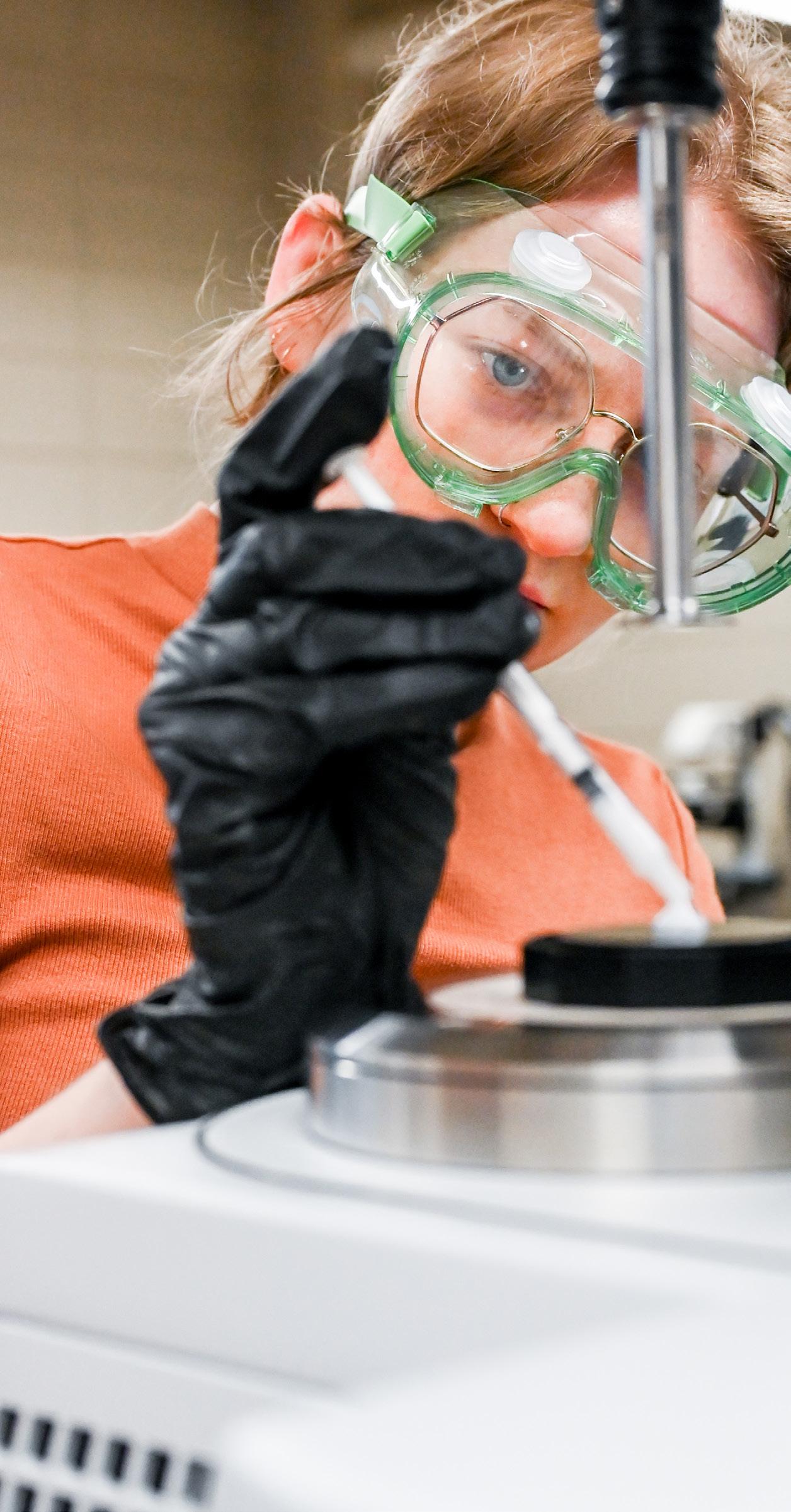
SUMMER RESEARCH
Summer 2025 marks the 39th annual Undergraduate Research Program. Last year, in Summer 2024, 16 students participated. During the school year, 53 students earned credit for research and three students completed a departmental honors thesis.
Laurel Washburn (Titus Albu, mentor): Theoretical Studies of Hydrogen Abstraction from Fluorinated Propanones and Fluorinated Propanals
Dallas Donovan (Meredith Barbee, mentor): Synthesis of Single Chain Polymer Nanoparticle Networks by Reinitiating RAFT Polymerization
Samuel Robinson (Meredith Barbee, mentor): Biomimetic Design of Mechanochromic Single-Chain Nanoparticle Polymer Networks
MOCS GIVE DAY
The fourth annual one-day fundraising effort known as Mocs Give Day was organized in October 2024. The generosity of our donors was amazing! We raised $5,105. These funds were used to support student conference travel and programs at the Clarence T. Jones Observatory. This year, Mocs Give Day will be on Tuesday October 7
